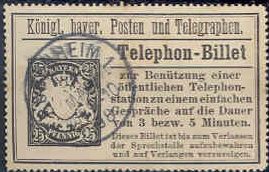
(Reduced size)
Return To Catalogue - Bavaria overview - Other German States - Germany
Note: on my website many of the
pictures can not be seen! They are of course present in the cd's;
contact me if you want to purchase them: evert@klaseboer.com.
Example, inscription 'Telephon-Billet', with image as postage stamps in black:

(Reduced size)
I have seen the values 10 p, 20 p, 25 p, 50 p and 1 M.
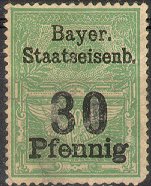
(Reduced view)
I have seen the following values:
With inscription 'Kgl. Bayer. Staatseisenb.': 5
p red and black, 10 p yellow and black, 20 p green and black, 25
p yellow and black, 30 p green and black, 40 p orange and black,
50 p lilac and black, 60 p blue and black, 70 p violet and black,
80 p yellow and black, 90 p brown and black, 100 p grey and
black, 2 M grey and green, 3 M brown and black and 5 M grey.
With inscription 'Bayer Staatseisenb.' 20 p
green and black, 30 p green and black, 40 p red and black, 50 p
violet and black, 60 p blue and black, 70 p brown and black, 80 p
orange and black, 90 p brown and black, 100 p grey and black, 2 M
grey and green, 3 M brown and red, 3 M brown and black, 5 M grey.
I've also seen a value of 20 p blue.
For more German railway stamps, click here.
First issue (arms type):
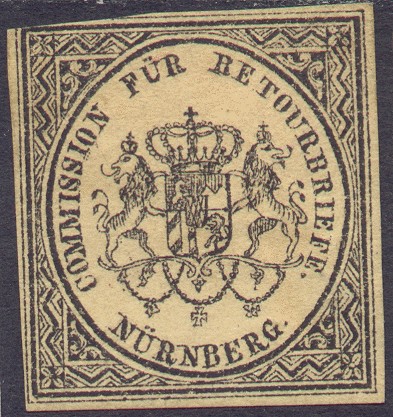
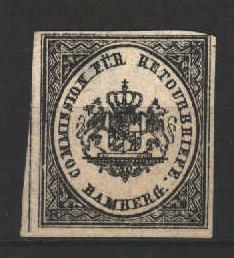
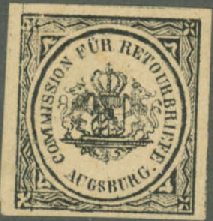
(Commission fur Retourbriefe Nurnberg and Bamberg)
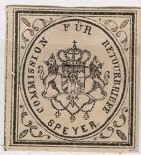
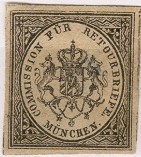
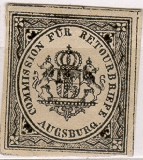
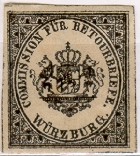
(Other cities, Speyer, Munchen, Augsburg and Wurzburg, reduced
view)
Second issue (1869 onwards) text type:
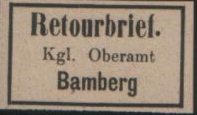
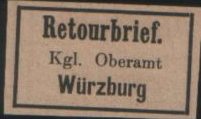
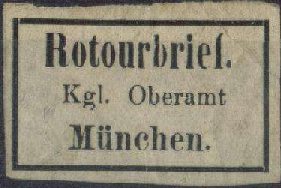
(Error: 'Rotourbrief' instead of 'Retourbrief')
These labels were supposed to be letters that were undeliverable to a chief-office. According to 'The Stamps of the German States' by B.W.H.Poole the chief-offices of Augsburg, Bamberg, Munich, Nurnberg, Speyer and Wurzburg existed in 1865. The arms type appeared first and full sheets of 84 stamps were printed for each office. Slight differences in design exist for most offices due to subsequent printings. For Nurnberg, even two different types exist on the same sheet. The office of Regensburg was added in 1869 with a different label (text type). The previous arms labels for the other offices were then superseded by the text type (probably all in sheets of 30).
Album Weeds mentions that forgeries of these stamps exist, without providing any detailed information, on the grounds that these labels are not real stamps.
(Sorry, no picture of a genuine stamp available yet)
25 p blue
Value of the stamps |
|||
vc = very common c = common * = not so common ** = uncommon |
*** = very uncommon R = rare RR = very rare RRR = extremely rare |
||
| Value | Unused | Used | Remarks |
| 25 p | *** | *** | |
Postcards with this design exist, either with 'BAEC' inscription or 'NURNBERG'.
The forger Peter Winter has made forgeries of this stamp, example:
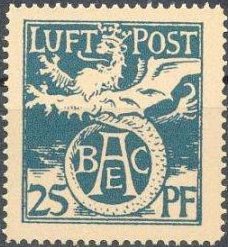

(Peter Winter forgeries, one with
cancel 'FLUGPOST 17 10 12 MUNCHEN')
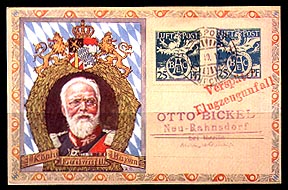
(reduced size, on letter)
I have seen some postcards identical to the one above, all adressed to 'OTTO BICKEL Neu-Rahnsdorf bei Berlin Allemagne Germany' with additional overprint 'Verspatet Flugzeugunfall'. I've been told that these are forgeries (also made by the forger Peter Winter maybe?). The name, stamp, cancel and overprint are all placed at a slightly different place in these forgeries. I've also seen this postcard-forgery without the adress, overprints, cancel and additional stamp.
A second forgery type exists in which the upper arm of the lion has lost its nails, with no top serif to the '2' and a small dot behind the '25' (sorry, no image available yet).
Examples:
With numerals in the upper corners, I have seen the values 2 k green, 6 k brown, 10 k brown, 12 k lilac, 30 p brown, 40 p orange. These were used on postcards: 1 k green, 2 k green, 5 p green. I have also seen a 2 k green and 12 k lilac printed together on one document.
With posthorns in the upper corners, I have seen the values 1 kr green, 3 k red, 3 k red on blue, 7 kr blue, 3 p green, 3 p brown, 5 p lilac, 5 p green, 10 p red, 10 p brown, 20 p blue. These were used on wrappers: 1 k green (on white or bluish paper), 3 p green, 3 p brown (on white or yellow paper). On envelopes: 10 p red (on bluish or white paper). Also on postcards: 3 p green, 5 p green and 10 p red.
Combinations of both (posthorn on top and values on top) also exist, example:
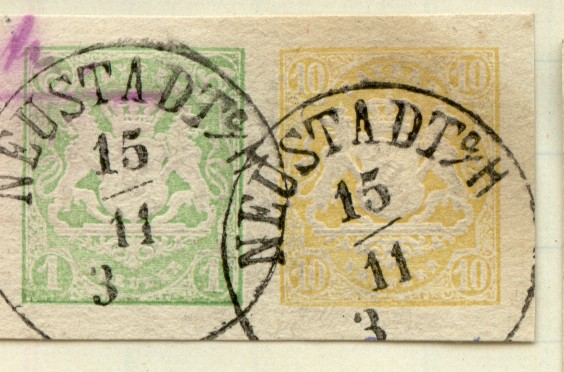
1 k green and 10 k yellow printed together on a 'Postanweisung'
Number, I have seen the values 2 p grey, 3 p brown, 3 p green, 5 p lilac and 5 p green. They were used on postcards (issued 1883).
Arms of Bavaria, inscription 'BAYERN' below:
I have seen the values 5 p green, 7 1/2 p green and 10 p red. With overprint 'Volksstaat Bayern' I have seen 10 p red, 15 p red and 25 p grey. With overprint 'Freistaat Bayern' I have seen 15 p brown.
Arms of Bavaria in an ellipse
1874 Embossed arms Drey Kreuzer red
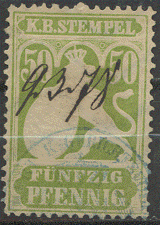
(Reduced size)
The following values exist: 10 p grey, 20 p yellow, 50 p green, 1 M blue, 2 M violet, 4 M red and 10 M orange.
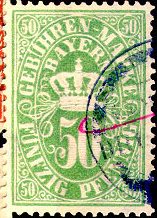
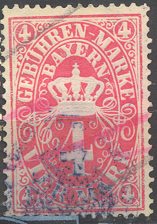
(Reduced sizes)
The values 10 p green, 20 p green, 30 p green, 40 p green, 50 p green, 1 M red, 2 M red, 3 M red, 4 M red, 5 M red, 10 M red and 20 M red exist. I have also seen '1 Milliarde' on 20 p green.
I have seen the values 10 p red, 50 p blue, 1 M
blue, 5 M brown, 10 M green, 50 M green, 100 M brown, 100 M red,
and 1000 M blue in the above design (other values might exist).
Also surcharged stamps '100 Milliarden' (green) on 100,000 M
brown.
The next stamps with inscription 'FREISTAAT BAYERN' or 'BAYERN' are probably proofs of non-issued designs:
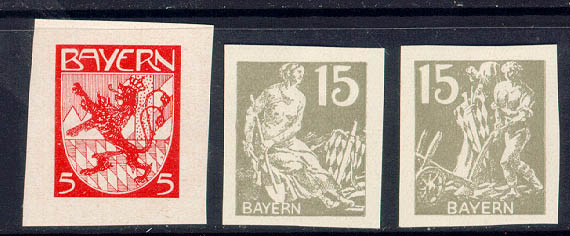
(Reduced sizes)
Enormous amounts of such proofs with non-issued designs appear to exist for Bavaria.
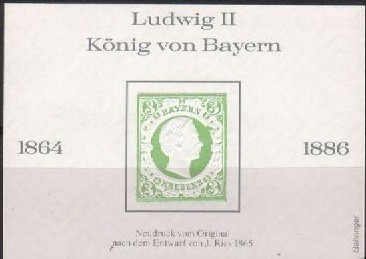
Reprint of a 3 k green proof of 1865 made by Gehringer with
Ludwig II, King of Bavaria, reduced size. Inscription 'Neudruck
vom Original'
I have seen the same sheets in other colours: 3 k lilac, 3 k brown, 3 k red, 3 k olive and 3 k blue.
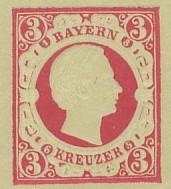
Cut from such a 'reprint' in the colour red.
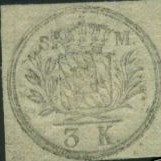
Seal 'S.M. 3 K.' printed in black with the arms of Bavaria, I
have seen many of such seals
1869(?) Bogus issue for Kissingen-Schweinfurt (Bavaria):
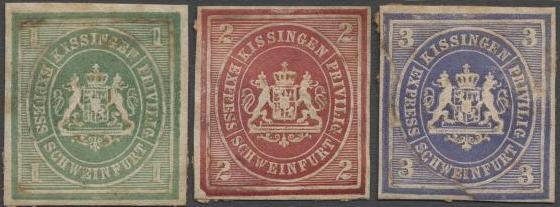
This issue is mentioned as 'Speculations' or 'Schwindelmarke' in Ferdinand Meyer's 'Handbuch fur Postmarkensammler' (Nuremberg 1881). Strong doubts about the genuineness of these stamps were already expressed in 'The American Journal of Philately' 1869, page 119. They seem to have been marketed by Ferdinand Elb (The Stamp Collectors Magazine, Dec, 1869, page 179).